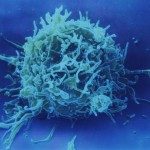A groundbreaking set of studies Science (Bastard et al., 2020; Zhang et al., 2020) lead by the Covid Human Genetic effort, has shown that more than 10% of the 987 patients with life-threatening COVID-19 pneumonia examined, had auto-antibodies against interferons (IFNs) at the onset of their infection.
Biochemical experiments confirmed these auto-antibodies can effectively curb the activity of type I interferons, the major anti-viral immune response. In some cases, they could be detected in blood samples taken before patients became infected; in others, they were found in the early stages of the infection, before the immune system had the time to mount a response.
How did the scientists confirm the role of interferon auto-antibodies in the development of severe COVID-19 pneumonia? One important aspect of this study was the comparison with the extraordinarily well characterized healthy population cohort – the Milieu Intérieur (MI) cohort. While patient responses to SARS-CoV-2 infection are highly variable, much of this is due to variability within immune responses. The Milieu Intérieur consortium was established to understand this variability by defining of the normal boundaries of a healthy immune response, and the characterization of their genetic and environmental determinants. Several clinical studies are utilizing our standardized immunomonitoring tools and datasets as a reference control population. These studies are identifying unknown immune perturbations in diverse conditions, from infection to autoimmunity and cancer.
In this study, 10% of the population with life-threatening COVID-19, showed the existence of interferon auto-antibodies, but this is relatively rare in the healthy population cohort as demonstrated in the MI cohort where it was present in 0.3% of the donors. However in these rare cases, the authors showed that these auto-antibodies are actually the underlying reason some people get very sick, and not the consequence of the infection.
This breakthrough, spearheaded by Jean-Laurent Casanova and Helen Su through the Covid Human Genetic effort, has opened several perspectives into the treatment, control and vaccination for the SARS-CoV-2 infection.
Visit the Milieu Intérieur website at Institut Pasteur
Email milieuinterieur@pasteur.fr to know more
Follow us on Twitter



